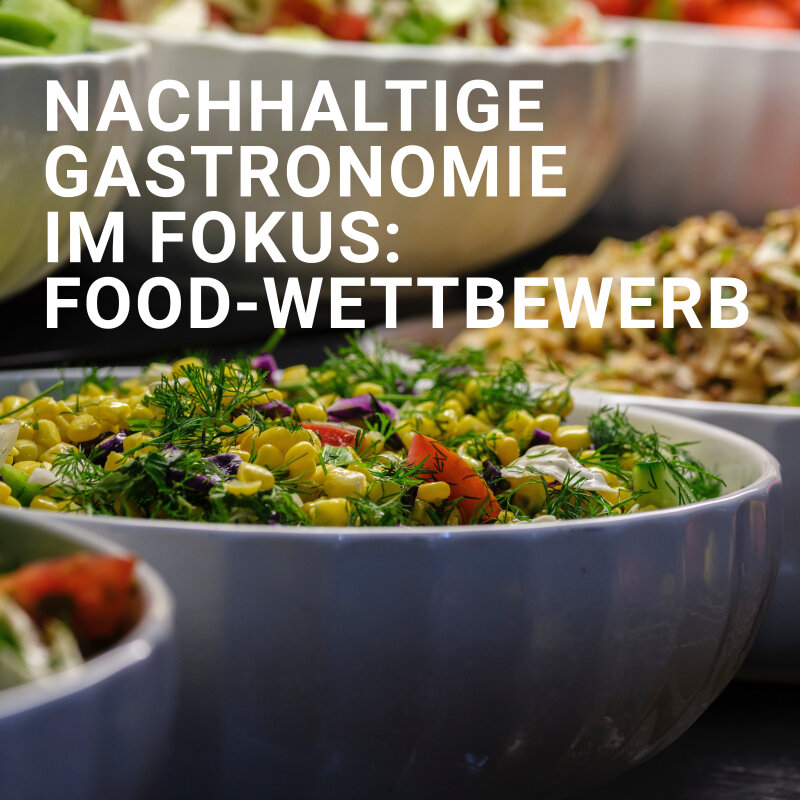Award-winning ideas for food change: Do-gooder competition for exemplary restaurants, community catering and producers
More and more companies in the catering, communal catering and food production sectors have recognized the signs of the times: It's about transformation to more sustainable, fairer, and better. The "Do-gooder Competition" honors concepts that stand out in this respect. This year's award ceremony was recently held in Berlin.
Dumplings made from surplus food that would otherwise have been thrown away, zero-waste restaurants or vegan food lines for canteens: The "Do-gooder Competition," launched in 2019, honors concepts that skillfully combine sustainability and enjoyment, responsible use of resources and quality. Prizes are awarded in three categories (restaurants, community catering and food products). A jury of seven experts, consisting of chefs, food producers, culinary consultants, and marketing professionals, will pre-select the entries and decide at the finale which of the applicants pitching for victory in each category will end up at the top of the podium. The evaluation criteria include the use of fresh and organic ingredients, seasonal and regional products, avoidance of waste and food waste, energy efficiency and , in the case of the gastronomy and food service concepts, sustainable equipment, clothing, and interiors.
Regenerative pizza and saved vegetables
After the competition was held digitally three times in a row - for well-known reasons - there was again a live final at the beginning of May 2023, for which the professional audience gathered at the "Engelnest" in Berlin-Schöneberg. Pitches of 9 minutes each were scheduled there: Julius Palm of "Followfood" from Friedrichshafen presented how climate and soil protection can be brought to the bottom of the dough using the example of the Bianca pizza created by the company - namely in the form of organic and regeneratively grown vegetables and grains that contribute to the preservation of the valuable hummus layer, which stores CO2. 12 tons of vegetables per week are now saved by the Berlin-based retailer "Querfeld" throughout Germany; they are sold to 80 large kitchens as well as online by the crate to private individuals. Juices, spritzers, ciders and non-alcoholic secco made from fruit from meadow orchards are produced and distributed by Wiesenkiez in Fulda, thus ensuring the preservation of these native natural refuges.
100% organic in the Allianz canteen
The fact that a conservative insurance company can be the first company in the city (Hamburg) to convert its canteen to 100% organic was presented by "Allianz Trade" and its contractual partner "apetito Catering": almost 90% of the workforce voted in favor of this conversion, despite slight price increases. “Organic Garden” has launched a holistic nutrition concept from its own farms to food lines for business catering as well as for daycare centers and its own restaurants. "Heavens Kitchen" from Stuttgart also appeals to the appetite of carnivores for plant-based cuisine with menus in which the vegan dishes are presented on compostable paper instead of plates in an eye-catching way on the tables. And the restaurant "Happa", also plant-based, which opened at the end of 2022, has been tailored by founders Sophia Hoffmann and Nina Petersen to their own needs and those of their team. "Hobenköök" from Hamburg, in turn, presents itself as a mixed concept of restaurant and market hall with sustainable ingredients.
"We believe in the power of business."
In the end, the jury chose "Followfood", "Organic Garden" and "Heavens Kitchen". While the "regenerative pizza" makes sustainable nutrition easy in everyday shopping, the food and kitchen concept of "Organic Garden" can be implemented even without professional cooks - and in the case of "Heaven's Kitchen" the combination of persuasion for plant-based cuisine and its unconventional presentation was convincing. They will receive prizes in the form of support for their sustainability communication, media services and climate protection workshops. It isn’t just the winning that counts, but the taking part, in this case, is quite true because they all contribute in an exemplary way to a change within the food industry, which has an enormous social impact. "We believe in the power of business - once you consider how many people we can reach with gastronomy, community catering or food," says Balázs Tarsoly of the Berlin agency "Branding Cuisine," which launched the competition. He is pleased that there are more and more ideas and concepts that are doing their part to improve the world.
It continues!
There will be another do-gooder competition in 2024. Anyone who would like to apply for the next edition or be inspired by the concepts and their ideas - more information is available at www.weltverbesserer-wettbewerb.de
